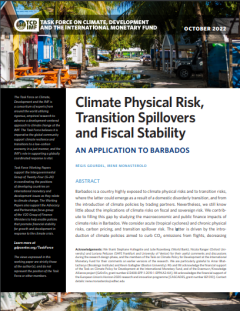
Countries in the Caribbean region, and among them Barbados, are a good example of climate risk exposure and vulnerability, and of challenges to access and deploy climate finance.
This paper assesses the macroeconomic, public finance and sovereign risk implications of both climate physical risks in Barbados, considering both acute and chronic impacts, and transition spillover risks. The analysis contributes to the understanding of how climate risk considerations can be included in the design of green financial policies and debt instruments to help the country mitigate and adapt to climate change.
The introduction of climate transition policies in Barbados to deliver on the Paris Agreement would require a reduction in the use of oil and a switch to renewable energy sources. The paper presents some key findings, for example, that by implementing domestic climate policies can decrease GHG emissions by up to 75%, with economic costs smaller than that of unabated climate change.
